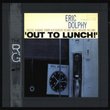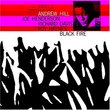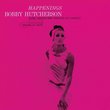| All Artists: Bobby Hutcherson Title: Dialogue Members Wishing: 3 Total Copies: 0 Label: Capitol Release Date: 8/15/1995 Genre: Jazz Styles: Modern Postbebop, Bebop Number of Discs: 1 SwapaCD Credits: 1 UPC: 077774653725 |
Search - Bobby Hutcherson :: Dialogue
 | Bobby Hutcherson Dialogue Genre: Jazz Today Bobby Hutcherson is one of the established giants of mainstream modern jazz. But in 1965, He was on the cutting edge of experimentation, working with Jackie McLean, Eric Dolphy, Andrew Hill and Archie Shepp. The pers... more » |
CD DetailsSynopsis
Album Description Today Bobby Hutcherson is one of the established giants of mainstream modern jazz. But in 1965, He was on the cutting edge of experimentation, working with Jackie McLean, Eric Dolphy, Andrew Hill and Archie Shepp. The personnel on Dialogue, his first album as a leader to be released, reads like a who's who of the creative front in jazz at the time: trumpeter Freddie Hubbarrd, reedman Sam Rivers, pianist/composer Andrew Hill, bassist Richard Davis and drummer/composer Joe Chambers. Rudy Van Gelder's vivid recording style captures all nuances of this amazing album. Added to the original LP is Andrew Hill's "Jasper" from the session. Produced by Alfred Lion. Recording engineer: Rudy Van Gelder. Recorded at the Van Gelder Studio, Englewood Cliffs, New Jersey on April 3, 1965. Remastered in 2001 by Rudy Van Gelder. All transfers from the analog tapes to digital were made at 24-bit resolution. The Players: Bobby Hutcherson: Vibes & Marimba Freddie Hubbard: Trumpet Sam Rivers: Tenor Sax, Soprano Sax, Bass Clarinet & Flute Andrew Hill: Piano Richard Davis: Bass Joe Chambers: Drums. Similar CDs
|
CD ReviewsThe best jazz album I know of Peter Baklava | Charles City, Iowa | 07/20/2005 (5 out of 5 stars) "Blue Note is often credited with a 'different approach' to 60's avant garde jazz. The difference, I would say, is due to a more studied, cerebral quality among the Blue Note issues. Hutcherson himself credits the expansive mood prevalent in New York City at the time--a willingness to 'cross-pollinate' art forms typified by the outdoor 'happenings' that were part of the scene. This record, "Dialogue", has the feel of synchronicity: six players on the same wavelength. The core of the record is formed by the two tracks, "Les Nois Marchant" and "Dialogue" which dovetail into each other seamlessly, with the feel of exploratory 20th Century chamber music. The ragtag processional, "Marchant" has a bit lighter mood than "Dialogue", which revolves around a repeated, stalking bass line. The rest of the record, frankly, seems haunted by the ghost of Eric Dolphy. One wonders if he would have participated in the sessions, had he not met an untimely death. "Idle While" sounds very like "Ode to Charlie Parker" from Dolphy's "Far Cry", although Hutcherson's floating vibes provide a supranormal glow to the piece. Sam Rivers provides Dolphyesque bass clarinet to the slightly off kilter blues, "Ghetto Lights", as well as a great, laid back soprano sax solo. Much of the music here anticipates directions that music would take in the next decade, predating the Art Ensemble of Chicago's forays into 'little instruments', and British progressive rockers like King Crimson openly acknowledge that they were listening to the Blue Note releases. They would certainly have heard this one, because King Crimson improvs were very similar in feel to this. The musicians on "Dialogue" are uniformly great. Freddie Hubbard and Richard Davis contribute some of their finest playing on record. This is a mentally stimulating record that will get those endorphins going--with no sweat involved. Don't pass it by." Spectacular, mysterious and addictive... Robert Bezimienny | Sydney, NSW Australia | 07/09/2005 (5 out of 5 stars) "'Dialogue' is one of the most listenable of the mid-sixties avante-garde Blue Note dates. Comparisons are drawn here and elsewhere to Dolphy's 'Out to Lunch' and Hill's 'Point of Departure', but 'Dialogue' has more tonality and rhythm to balance the dissonance. This disc finds its way into my CD player five times as often as the other two mentioned. * If it appeals, you might seek out Hutcherson's 'Happenings', currently available on Amazon as a moderately priced Japanese import. Herbie Hancock features, and his playing is as interesting here as it is anywhere - the feel is more intense than on 'Dialogue', the startling cerise cover art a fair indication of what awaits. 'Vertigo' by Jackie McLean features similarly inspired piano work from Herbie, while McLean's 'One Step Beyond' has the leader in fabulous 'in and out' form, and Hutcherson bringing along a variety of intriguing moods - this album is available, with 24bit remastering, through Mosaic records in their Grachan Moncur 'Select' release; another McLean disc, 'Destination Out', available readily as an RVG remaster, has Hutcherson at his most intricate and surprising, the sparse arrangements giving room to hear all his nuances. * Another great date with Hutcherson and Hill is the latter's 'Judgment!'; and there's also Big John Patton's disc, 'Let 'Em Roll', which just might be his best, with Hutcherson, Grant Green, and Otis Finch on drums. Most of the discs with Hutcherson as leader are excellent, albeit less surprising than 'Dialogue' and 'Happenings'; 'Patterns' has some particularly beautiful moments; 'The Kicker' and 'Stick-Up' are solid, the latter showcasing Joe Henderson's talent; 'Oblique', with Herbie again, is due to be re-released on the 2nd of August, 2005; the magic is lost, however, on 'Medina', the release of these sessions having been deferred for good reason. * 'Dialogue' wound rank in my top ten of all Blue Notes." One of Blue Note's Finest Paul R. Greene Jr. | Knoxville, TN | 12/19/2006 (5 out of 5 stars) "While Blue Note may have been known during the early-to-mid 60s for its string of soul-flavored boogaloo records, there was also during that same period an outpouring of forward thinking, experimental post-bop that challenged the boundaries of jazz convention without dispensing altogether with structure. Led by artists such as Andrew Hill, Bobby Hutcherson, Grachan Moncur III, Jackie McLean, Sam Rivers, Wayne Shorter and Joe Henderson, Blue Note's offerings from 1962-65 were without peer. And if I'm making a list of my favorite Blue Note recordings, regardless of era, then I'm placing Hutcherson's Dialogue in the top five.
Though is nominally a Hutcherson record, it is in many ways an Andrew Hill record; adventurous, yet accessible. Hill composed four of the albums' six songs, and the flavor of Hill's jagged and harmonically dense piano is predominant throughout the record. The opening song, "Catta," is a clear example of Hill's unique approach to composition, placing a repetitive line on top of an odd-metered mambo rhythm. Also evident throughout is Hill's penchant for probing the outer boundaries of meter and harmony, while keeping one foot firmly rooted in compositional structure. But that's not to belittle the contributions of Hutcherson, whose unique approach to the vibes, with it's airy, spacious feel, gives the recording that unmistakable Hutcherson sound. Another important contributor is the vastly underrated drummer/composer, Joe Chambers. Along with having one of the best grooves this side of Billy Higgins, Chambers is an excellent composer. His contributions "Idle While," a beautiful, lilting waltz-time number, and "Dialogue," with its outward leaning, spooky haunted house feel, illustrate his unique compositional talents. I would be remiss not to mention the contributions of this records' A-list supporting cast, which includes trumpeter Freddie Hubbard, Sam Rivers on tenor and soprano sax, as well as bass clarinet and flute, and the amazing Richard Davis on bass. Hubbard once again shows his ability to stretch beyond the conventions of his hard-bop roots, and Rivers shows his incredible versatility as a multi-reedist. I have to take exception with N. Dorward of Toronto's remark that Rivers is in "middling form" on "Catta." While I do concur that it is perhaps the strongest composition here, Rivers' tenor solo is wonderful; well constructed, purposeful and probing, without losing site of the song's melody. And as usual, you will not find a better, more versatile bass player than Richard Davis, a classically-trained player with an ear for melodic exploration. Hutcherson made a number of appearances on the Blue Note label during the early-to-mid 60s, and I've yet to find one that I don't like. Other excellent examples of Hutcherson at his best include his other collaborations with Hill, Andrew!!! and Judgment, as well as Eric Dolphy's Out To Lunch, Jackie McLean's One Step Beyond and Destination Out, Grachan Moncur III's Evolution, Grant Green's Idle Moments, as well as Hutcherson's own Oblique, Stick-Up and Happenings. I highly recommend this recording for anyone that's a fan of avant-garde or post-bop jazz, as well as any fan of Andrew Hill. This is clearly a case of a pure five-star record, and not the typical gushing, hyperbole-filled amazon five-stars." |



